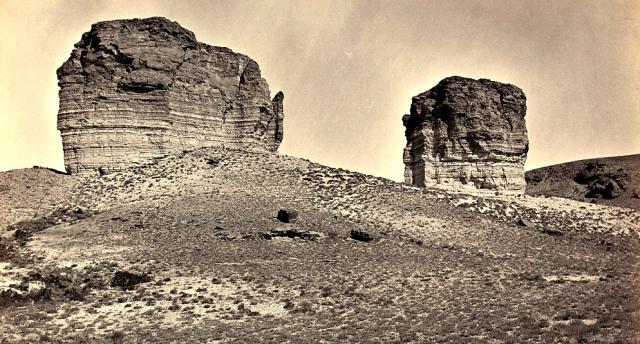
The Teapot Dome Scandal has been compared to Watergate and Enron and is considered one of the most nefarious political disgraces in U.S. history.
A U.S. senator remarked on the scandal of his time, “The trail is one of dishonesty, greed, violation of law, secrecy, concealment, falsehood and cunning.”
More than 90 years later the trail stops with an honest deal struck by an oil company that honored its word.
Matthew E. Meagher, president and CEO of Denver’s Meagher Energy Advisors Inc., provided advisory services to the U.S. Department of Energy on the $45.2 million sale to Stranded Oil Resources Corp. (SORC).
Meagher said many people wanted to own such a prominent part of history—especially one that had produced 28.5 million barrels (MMbbl) of oil with an estimated 300 MMbbl in place. Thirty companies submitted inquiries and qualified to present an offer.
Meagher first had to change the perception that the grounds themselves were polluted and contaminated after roughly a century of use and 1,400 wellbores. Assumptions that producers would face environmental issues, oil in the dirt and other problems were simply wrong. On a visit, Meagher found a desolate patch of Wyoming that was well cared for—and a good source of future hunting leases.
“When we first went to the field, we were completely amazed how clean of a facility it was,” he said.
The field was first marketed in July 2014, when oil was trading at $105/bbl.
Designated Naval Petroleum Reserve 3 (NPR-3), the Teapot Dome is an oil and gas field 35 miles north of Casper, Wyo. The historic field lies along the southwestern edge of the Powder River Basin. The major producing formations of the field are the Cretaceous aged Shannon Sandstone, Steele and Niobrara shales, Second Wall Creek (Frontier) and Pennsylvanian Tensleep.
In September, the field generated nine solid bids. Oil had fallen to $91.
Teapot Dome, consisting of 9,481 acres, was set aside as a naval oil reserve in 1915 and is best known for its connection to a scandal that rocked the Harding Administration in the 1920s.
Accusations emerged that Interior Secretary Albert B. Fall leased the reserve to a private oil company in return for loans totaling $400,000 (about $5.6 million today). The story made national headlines. Fall was convicted of bribery and became the first former cabinet officer sent to prison.
The Supreme Court invalidated the oil leases in 1927 and the Teapot Dome field was shut down.
On Oct. 27, an offer was accepted. Oil had fallen to $81/bbl.
The field linked to a scandal centering on a lack of competitive bidding was this time the culmination of a rigorous process that winnowed out many potential buyers.
But a purchase and sale agreement could not be signed when the deal was struck, Meagher said, since the surface first had to be reviewed according to federal guidelines pertaining to national and state historical preservation acts for cultural interests. SORC, however, was undeterred.
“They were willing to put down a 10% deposit without signing a purchase and sale agreement,” Meagher said.
As the weeks and months passed, oil prices continued to plummet.
“As the process went on, I informed the Department of Energy we were losing value daily as the prices dropped,” Meagher said. “And people were walking away from performance deposits on similar transactions around the country.”
The deal finally closed after 95 days, on Jan. 30. By then, oil was trading at $45/bbl, $60 less than when the property had been offered. SORC didn’t budge.
“The buyer honored their original sale price,” Meagher said. “They didn’t ask for any reduction in price. It tells you about the character of the buyer. These were people that honored their word and did exactly what they said they would do.”
Meagher has sold many assets over the years, with properties ranging from $5 million to $2 billion. This deal was special. He’s now the seller of the Teapot Dome.
“It’s not just your normal transaction. It required a different line of thinking and effort,” he said. “These are more fun to work on in many respects because it’s not just selling a typical oil field out in the middle of Wyoming.
“This has historical significance,” he said. “And after 34 years of doing this, you feel a professional pride for taking on this type of transaction and fulfilling a congressional mandate.”
Recommended Reading
Nabors SPAC, e2Companies $1B Merger to Take On-Site Powergen Public
2025-02-12 - Nabors Industries’ blank check company will merge with e2Companies at a time when oilfield service companies are increasingly seeking on-site power solutions for E&Ps in the oil patch.
Crescent Energy Closes $905MM Acquisition in Central Eagle Ford
2025-01-31 - Crescent Energy’s cash-and-stock acquisition of Carnelian Energy Capital Management-backed Ridgemar Energy includes potential contingency payments of up to $170 million through 2027.
DNO to Buy Sval Energi for $450MM, Quadruple North Sea Output
2025-03-07 - Norwegian oil and gas producer DNO ASA will acquire Sval Energi Group AS’ shares from private equity firm HitecVision.
Whitewater Management Buys Permian’s Orion Water Solutions
2025-03-03 - Whitewater Management is buying Orion Water Solutions for an undisclosed amount to expand its wastewater treatment offerings.
Ring Energy Bolts On Lime Rock’s Central Basin Assets for $100MM
2025-02-26 - Ring Energy Inc. is bolting on Lime Rock Resources IV LP’s Central Basin Platform assets for $100 million.
Comments
Add new comment
This conversation is moderated according to Hart Energy community rules. Please read the rules before joining the discussion. If you’re experiencing any technical problems, please contact our customer care team.






